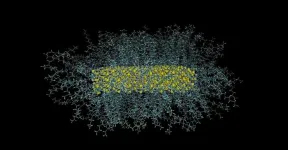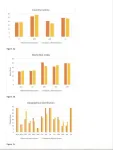(Press-News.org) Bridging Our Political Divide collects the insights of a psychologist who offers antidotes to the unproductive arguments that now dominate our political culture and ways to find common ground.
New York, U.S./Oxford, UK, October 14, 2024 – As the 2024 US Presidential Election in November inches closer, the partisan divide in American society has never felt more apparent – or pervasive.
From workplace chatter to heated discussions at family gatherings, many Americans may have asked themselves, ‘How can I make this person understand me? How can I better take control of political debates when they arise?’
These questions sit right at the center of a new book, Bridging Our Political Divide: How Liberals and Conservatives Can Understand Each Other and Find Common Ground, by Kenneth Barish.
The Clinical Professor of Psychology teaches us how to listen, think, and speak about our political opinions in a way that allows us to understand each other's concerns, resist false dichotomies and ideological certainty, see new perspectives and possibilities, and find common ground.
He explains: “We are more likely to be open-minded when new facts are presented in the context of dialogue; when we feel that our needs and feelings have been acknowledged; if we feel respected; and when we are less afraid... For coming closer together, we need to cultivate this openness, to the extent possible.”
What does it mean to be ‘liberal’ or ‘conservative’?
The existence of these oppositional political beliefs is far from new. Barish, who is a Fellow of the American Psychological Association, offers a brief history as a way of understanding our current political divide.
In Roman politics, the Optimates (“best men”) believed in preserving tradition while the Populares (“favoring the people”) proposed welfare programs and the expansion of citizenship rights.
Although presented in changed forms, these early conflicts form the basis of liberalism and conservatism today. Conservative political ideas can be understood as maintaining the existing social order and reacting to perceived threats. Meanwhile, liberalism is described as a belief in humane social reform and questioning established authority.
He explains: “The greater the perceived threat or excess, the more impassioned the conservative reaction; in a similar way, the greater the perceived cruelty or injustice, the more impassioned the liberal desire for change.”
How these polar attitudes can present
One of Bridging Our Political Divide’s key arguments is that these political attitudes are not limited to politics. Liberal and conservative sensibilities permeate all aspects of life, from science to art, from how children are raised to how an institution is run.
Barish carefully notes that, while there are essential truths to both liberalism and conservatism, they can be expressed in moderate or extreme forms.
He explains that extreme forms of conservatism, for example, are often authoritarian, intolerant, xenophobic and fundamentalist, or disguised justifications for protecting hierarchy and privilege.
In contrast, he suggests extreme liberalism “denies the legitimacy of current institutions and regards them as evil. The greater the felt illegitimacy of institutions, the greater the extremism. In its radical forms, liberalism believes that institutions are always wrong and aggrieved individuals are always right.”
Finding solutions
Barish identifies the emotions that sit below our political opinions – resentment, humiliation, pride and fear. Bridging Our Political Divide builds towards centering those emotions in our dialogue.
Barish notes: “One of the major themes of this book is that we are motivated in our political opinions first by feelings and secondarily by ideas or beliefs. Our political opinions begin with what feels right or wrong to us.”
According to the scholar, we can only begin to understand why we disagree – and how we can talk to one another more constructively – once we understand why our opponents feel the way they do. Although listening is difficult when strong feelings and opinions are involved, Barish shows us how dialogue is possible, even when we strongly disagree.
“We should express our “opinions” less often and, instead, express our “concerns.” We need to consider someone else's opinion with greater charity and regard our own with less certainty and more humility,” he explains.
“We need to acknowledge the limits of our political attitudes and ideology and work toward greater pragmatism. We need to think less often of “either/or” and “for/against,” and more often of "how" and “and/also.”
Bridging Our Political Divide is an essential contribution to a better national conversation. Barish offers a host of workable proposals, including building collaborative problem-solving discussions, identifying an opponent’s most reasonable arguments, understanding the limits of one’s own political philosophy and making small changes in response to another’s concerns.
Barish encourages readers, armed with his insights and potential solutions, to identify the ways that they can stretch across partisan divisions with a view toward building a better society for America’s future generations.
END
How liberals and conservatives can have better conversations, according to a psychologist
A psychologist has explained the sources of political beliefs in the U.S., why liberalism and conservatism appeal to different individuals and why we continue to disagree about fundamental issues in American life.
2024-10-14
ELSE PRESS RELEASES FROM THIS DATE:
Survey finds 25% of adults suspect they have undiagnosed ADHD
2024-10-14
COLUMBUS, Ohio – Attention deficit/hyperactivity disorder – also known as ADHD – is typically thought of as a childhood condition. But more adults are realizing that their struggles with attention, focus and restlessness could in fact be undiagnosed ADHD, thanks in large part to trending social media videos racking up millions of views.
A new national survey of 1,000 American adults commissioned by The Ohio State University Wexner Medical Center and College of Medicine finds that 25% of adults now suspect they may have undiagnosed ADHD. But what worries mental health experts is that only 13% of survey respondents have shared their suspicions with their doctor.
That’s ...
Let there be light: Bright future for solar panels, TV screens and more
2024-10-14
From brighter TV screens to better medical diagnostics and more efficient solar panels, new Curtin-led research has discovered how to make more molecules stick to the surface of tiny nanocrystals, in a breakthrough that could lead to improvements in everyday technology.
Lead author Associate Professor Guohua Jia from Curtin’s School of Molecular and Life Sciences, said the study investigated how the shape of zinc sulfide nanocrystals affected how well molecules, known as ligands, stick to their surface.
“Ligands, play an important role in controlling the behaviour and performance ...
Innovative nanoparticle therapy targets fat absorption to combat obesity
2024-10-13
(Monday 14 October 2024, Vienna, Austria) Researchers have unveiled a novel approach to tackle obesity by targeting fat absorption in the small intestine. The cutting-edge nanoparticle system, engineered to deliver therapeutic molecules directly to the digestive tract, has shown significant potential to prevent diet-induced obesity.1,2
Presented today at UEG Week 2024, the study focuses on an enzyme called Sterol O-acyltransferase 2 (SOAT2), which plays a critical role in fat absorpsion in the small intestine.3,4 By inhibiting this enzyme in the small intestine, the study offers a promising therapeutic approach to reduce fat absorption ...
Novel procedure combined with semaglutide may eliminate insulin dependency in type 2 diabetes
2024-10-13
(Monday 14 October 2024, Vienna, Austria) Groundbreaking research presented today at UEG Week 2024 reveals a promising new treatment strategy for type 2 diabetes (T2D) that could significantly reduce or even eliminate the need for insulin therapy.1
This innovative approach, which combines a novel procedure known as ReCET (Re-Cellularization via Electroporation Therapy) with semaglutide, resulted in the elimination of insulin therapy for 86% of patients.
Globally, T2D affects 422 million people, with obesity recognised as a significant ...
Three key signs of major trauma could speed up treatment of severely injured children brought to emergency departments by carers not ambulances
2024-10-13
Copenhagen, Denmark: Severely injured children who are brought to an emergency medical department by their parents or carers are often not seen as quickly as those who arrive at hospital via ambulance, according to findings presented at the European Emergency Medicine Congress today (Monday). [1]
The study’s researchers identified three key trauma features that should prompt doctors to review these patients immediately and potentially prioritise their treatment: boggy swelling to the head, abdominal bruising, and thigh swelling or deformity.
The study was carried out in an inner-city ...
Climate change is a health emergency too
2024-10-13
Copenhagen, Denmark: International experts in emergency medicine have warned that climate change is likely to have a severe impact on emergency services around the world. Despite this, few countries have assessed the scale of the impact or have a plan to deal with it.
In a special session at the European Emergency Medicine Congress today (Sunday), Luis Garcia Castrillo, a professor in emergency medicine, now retired, at the Hospital Marqués de Valdecilla, Santander, Spain, described how he and colleagues from EUSEM’s Emergency Medicine Day working group had asked 42 focus groups, consisting of experts in emergency medicine, prehospital care ...
Chronic stress accelerates colorectal cancer progression by disrupting the balance of gut microbiota, new study shows
2024-10-12
(13 October 2024, Vienna, Austria) Cutting-edge research has uncovered how chronic stress disrupts the balance of gut microbiota to speed up the progression of colorectal cancer (CRC), opening new avenues for CRC prevention and treatment.1
By eliminating certain gut bacteria and inducing stress, researchers were able to conclude a relationship between stress and gut microbiota in the progression of CRC, identifying a particular bacterial species as a potential therapeutic target.
Presenting the study at UEG Week 2024, lead researcher Dr Qing Li explained, “In our study, we used an antibiotic ...
Brazilian study identifies potential targets for treatment of visceral leishmaniasis
2024-10-11
Researchers at the Federal University of São Carlos (UFSCar), the State University of Campinas (UNICAMP) and the University of São Paulo (USP) in Brazil have characterized for the first time a class of proteins present in the parasite Leishmania infantum and involved in regulating its cell cycle. In an article published in PLOS Pathogens, they describe potential pharmaceutical targets for the treatment of visceral leishmaniasis. Existing therapeutic strategies are considered insufficiently effective.
In eukaryotic organisms, which have cells with a defined nucleus and include all plants and animals, the ubiquitin-proteasome system (UPS) ...
Using AI and iNaturalist, scientists build one of the highest resolution maps yet of California plants
2024-10-11
With the help of deep learning, University of California, Berkeley, scientists have leveraged citizen science data from the app iNaturalist to create the highest resolution maps yet of plant distributions throughout California.
iNaturalist is a widely-used cellphone app, originally developed by UC Berkeley students, that allows people to upload photos and the location data of plants, animals or any other life they encounter and then crowdsource their identity. The app currently has more than 8 million users worldwide who collectively have uploaded more than 200 million observations.
The researchers used a ...
Researchers identify signs tied to more severe cases of RSV
2024-10-11
Respiratory syncytial virus (RSV) is the leading cause of hospitalization in young children due to respiratory complications such as bronchiolitis and pneumonia. Yet little is understood about why some children develop only mild symptoms while others develop severe disease. To better understand what happens in these cases, clinician-scientists from Brigham and Women’s Hospital, a founding member of the Mass General Brigham healthcare system, and Boston Children’s Hospital analyzed samples from patients’ airways and ...
LAST 30 PRESS RELEASES:
ASU researchers to lead AAAS panel on water insecurity in the United States
ASU professor Anne Stone to present at AAAS Conference in Phoenix on ancient origins of modern disease
Proposals for exploring viruses and skin as the next experimental quantum frontiers share US$30,000 science award
ASU researchers showcase scalable tech solutions for older adults living alone with cognitive decline at AAAS 2026
Scientists identify smooth regional trends in fruit fly survival strategies
Antipathy toward snakes? Your parents likely talked you into that at an early age
Sylvester Cancer Tip Sheet for Feb. 2026
Online exposure to medical misinformation concentrated among older adults
Telehealth improves access to genetic services for adult survivors of childhood cancers
Outdated mortality benchmarks risk missing early signs of famine and delay recognizing mass starvation
Newly discovered bacterium converts carbon dioxide into chemicals using electricity
Flipping and reversing mini-proteins could improve disease treatment
Scientists reveal major hidden source of atmospheric nitrogen pollution in fragile lake basin
Biochar emerges as a powerful tool for soil carbon neutrality and climate mitigation
Tiny cell messengers show big promise for safer protein and gene delivery
AMS releases statement regarding the decision to rescind EPA’s 2009 Endangerment Finding
Parents’ alcohol and drug use influences their children’s consumption, research shows
Modular assembly of chiral nitrogen-bridged rings achieved by palladium-catalyzed diastereoselective and enantioselective cascade cyclization reactions
Promoting civic engagement
AMS Science Preview: Hurricane slowdown, school snow days
Deforestation in the Amazon raises the surface temperature by 3 °C during the dry season
Model more accurately maps the impact of frost on corn crops
How did humans develop sharp vision? Lab-grown retinas show likely answer
Sour grapes? Taste, experience of sour foods depends on individual consumer
At AAAS, professor Krystal Tsosie argues the future of science must be Indigenous-led
From the lab to the living room: Decoding Parkinson’s patients movements in the real world
Research advances in porous materials, as highlighted in the 2025 Nobel Prize in Chemistry
Sally C. Morton, executive vice president of ASU Knowledge Enterprise, presents a bold and practical framework for moving research from discovery to real-world impact
Biochemical parameters in patients with diabetic nephropathy versus individuals with diabetes alone, non-diabetic nephropathy, and healthy controls
Muscular strength and mortality in women ages 63 to 99
[Press-News.org] How liberals and conservatives can have better conversations, according to a psychologistA psychologist has explained the sources of political beliefs in the U.S., why liberalism and conservatism appeal to different individuals and why we continue to disagree about fundamental issues in American life.




